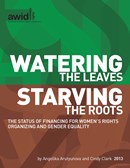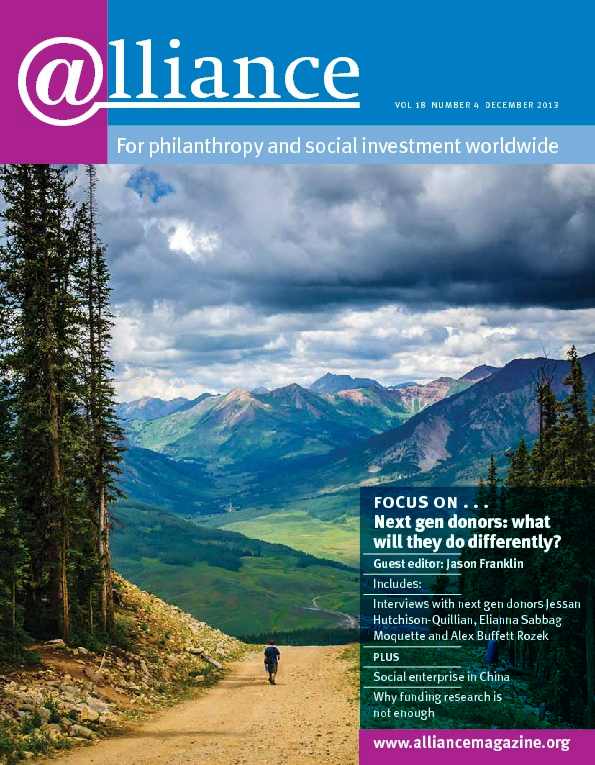So where is the money for women’s rights? In its latest report, Watering the Leaves, Starving the Roots: The status of financing for women’s rights organizing and gender equality, AWID presents research findings gathered over the last two years to help women’s rights organizations and their funder allies make sense of, and adapt to, the rapidly changing funding landscape. As yet, it seems a growing interest in women and girls is not resulting in more money.

As the sources of development financing and philanthropy have become increasingly diversified, and women and girls are increasingly recognized as key agents in development, the central question, in most international policy or funding spaces, is no longer ‘what about women?’ but ‘how can women and girls best be supported?’ So far, this question has not been answered in any material way: while the ‘leaves’, the individual women and girls, are receiving growing attention, ‘the roots’ – sustained, collective action by feminists and women’s rights activists and organizations – continue to be neglected.
Data from the 2011 global survey of over 1,000 women’s organizations indicates moderate growth: median annual income doubled between 2005 and 2010, reaching US$20,000; 7 per cent (up from 4 per cent in 2005) reported 2010 budgets of over $500,000. Most of these organizations remain quite small – not by choice but because of lack of resources; many reported having to cut activities or staff. Moreover, 48 per cent of survey respondents reported never having received core funding while 52 per cent had never received multi-year funding.
If the ‘new’ interest in women and girls is not translating into resources for women’s rights organizations, what is happening among the more ‘traditional’ funding sectors? Bilateral agencies, international NGOs, private foundations and women’s funds have explored partnering with private companies or corporate foundations. Overall, the 2012 review on Financing for Gender Equality and the Empowerment of Women at the Commission on the Status of Women found that little progress had been made in increasing funding for women’s organizations and gender equality – although official development assistance (ODA) to women’s equality NGOs doubled between 2008 and 2011. However, AWID surveys show that the share of income that women’s organizations reported from international NGOs dropped from 14 per cent in 2005 to 7 per cent in 2010.
Foundations remain an important source of support for many women’s organizations, but, despite some long-standing champions – Sigrid Rausing Trust and the Ford, Open Society, Oak, Gates and MacArthur Foundations – US and European foundation giving in the area has been largely stagnant. Data on the growing number of private foundations in the global South is limited. The diversity within this sector continues to pose challenges when it comes to trying to influence foundations to more significantly support women’s rights organizing.
Women’s funds are important funders and allies of women’s rights movements. Though their resources are limited, they are an important intermediary channel for grants to grassroots organizations. The combined 2010 income reported by 42 women’s funds in AWID’s research was over $54.5 million, though 57 per cent of them reported income of $500,000 or less in 2010. Total grantmaking by 37 women’s funds was close to $28 million in 2010. Key to their funding strategy has been an emphasis on flexible, core, multi-year support for women’s rights organizing.
What is the message for funders from all this? Multi-year and core funding are key to good results, since they offer the possibility of strengthening and stabilizing organizations. If you are a funder, consider funding an existing intermediary. Women’s rights organizations are diverse, many of them working at the grassroots and playing crucial roles in transforming the lives of women and girls. Intermediaries can reach these smaller organizations where a larger funder might not. Finally, accountability mechanisms need to take into account not only the quantity of pledged funding but also the disbursement of resources and, most importantly, the results that funding is contributing to.
Women’s rights organizations should be a priority partner for any donor interested in making sustainable change happen for women’s rights and gender equality.
Angelika Arutyunova is programme manager, Association for Women’s Rights in Development. Email aarutyunova@awid.org
To download the report
http://www.awid.org/Library/Watering-the-Leaves-Starving-the-Roots





Comments (0)